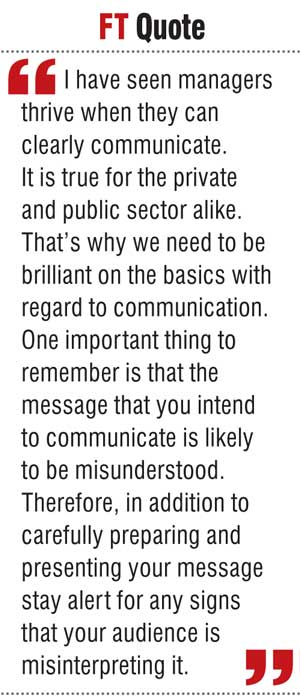Sunday Feb 15, 2026
Sunday Feb 15, 2026
Monday, 4 July 2016 00:09 - - {{hitsCtrl.values.hits}}

It is essential for managers to be effective communicators in order for them to drive success - AFP
Managers, local or global, need to be effective communicators. Sadly we see quite the opposite in many instances. People who are supposed to be knowledgeable are not sharing that knowledge in the best possible manner. How can Sri Lankan managers strengthen confidence and competence in relation to communication? Are they aware of the communication challenges? My attempt here is to relate, reflect and reinforce the realms of communication with due consideration of the key challenges.
 Overview
Overview
Communication comes from the Latin root word ‘communicare’, meaning to share. It is to keep information in common. Therefore, communication, in brief, is information exchange. It even goes beyond. It is the activity of conveying information through the exchange of thoughts, messages or information as by speech, visuals, signals, writing or behaviour.
Effective communication is crucial for the success of individuals as well as institutions.
This is true within the individual organisation itself as well as how that organisation communicates with other organisations within its sphere of contact, influence and competition. As scientists explain, communication is a complex two-way process involving the encoding, translation and decoding of messages. Effective communication requires the communicator to translate their messages in a way that is specifically designed for their intended audience.
I have seen managers thrive when they can clearly communicate. It is true for the private and public sector alike. That’s why we need to be brilliant on the basics with regard to communication. One important thing to remember is that the message that you intend to communicate is likely to be misunderstood. Therefore, in addition to carefully preparing and presenting your message stay alert for any signs that your audience is misinterpreting it.
Let’s look at the communication challenges associated with writing, speaking, reading and listing in using seven Cs. They are the challenges being correct, courteous, considerate, complete, concise, coherent and clear.
Correctness challenge
In writing, the message should be grammatically correct. The ability to write grammatically correct sentences is assumed in the corporate and administrative world. Grammatical errors create a very bad impression about the writer and they can be very distracting and annoying to the reader.
The concept of correctness extends beyond grammatical correctness. Not only should grammar and spelling be correct but content must also be correct. A mechanically correct letter that contains the wrong date for an important meeting, specifies the wrong size or quantity for an order or quotes an incorrect price is seriously flawed.
This applies to reading in grasping the accurate message. It also applies to speaking in conveying the accurate message. With regard to listening, getting the right message from the speaker is the challenge.
Sri Lankan managers can be conscious of the correctness in order to avoid any confusion when they communicate.
Courteousness challenge
Professional writing should always be courteous. So is the speaking in many occasions. Also for listening, it is important to show courtesy to the speaker, whenever possible.
According to age-old wisdom, good manners are a part of good business. Please and thank you are important elements of business writing, whether they are expressly stated or only implied.
Just for comparison, consider the following pair of statements:
Obviously, the second one is more courteous. What matters first is the mindset.
Consideration challenge
Courteous and considerate are related ideas but they are not identical. Courteous refers more to word choice, to saying please and thank you. Considerate refers more to a general attitude, what is usually referred to in business writing as the ‘You-Attitude’. In order words the effective professional communicator always tries to think in terms of the receiver and to see the situation from the receiver’s viewpoint. The considerate communicator is tactful and does not alienate the receiver.
Instead of saying, “You didn’t send your cheque”, it is far more considerate to say, “We have not received your cheque yet”. The consideration challenge involves focus on more the recipient than the initiator.
Sri Lankan managers can strengthen the aspect of consideration by developing more empathy. It is the capacity to understand the other person. It is a matter of getting into the other’s shoes and seeing the world from the other’s point of view. Many disputes ranging from individual clashes to industrial disputes can be a result of not having empathy. There are two sides to a coin and one should avoid one-sided decisions.
Completeness challenge
 “A good speech should be like a woman’s skirt: long enough to cover the subject and short enough to create interest,” according to Winston Churchill. A message is complete when it contains all the information that it should contain. Just what that information is,of course will depend on the nature of the message.
“A good speech should be like a woman’s skirt: long enough to cover the subject and short enough to create interest,” according to Winston Churchill. A message is complete when it contains all the information that it should contain. Just what that information is,of course will depend on the nature of the message.
For example, organisations frequently are unable to fulfil a sender’s request for information or products because the sender failed to include a return address. No matter how well-written these requests are they are incomplete and unsuccessful.
The announcement that fails to include the location or time, the order that fails to show colour or size, the phone message that omits the area code are all incomplete and ineffective. To be effective, a message must be complete. It must contain everything the particular situation requires.
This reminds me what Rudyard Kipling said a long time ago.
I KEEP six honest serving-men
(They taught me all I knew);
Their names are What and Why and When
And How and Where and Who.
For a message to be complete, managers should pay adequate attention to these five Ws and one H. Instead of saying, “The time for next week’s board meeting has been changed to 3:15p.m,” it is far more complete to say, “The board meeting has been rescheduled for Tuesday, 5 May, at 3.15 p.m. in Room 4 because of the Chairman’s overseas visit.”
Conciseness challenge
“I didn’t have time to write a short letter so I wrote a long one instead,” so said, Mark Twain. Conciseness does not necessarily mean brevity but effectiveness with the optimum use of words.
When we say that a message is concise we mean that it is not longer than it needs to be in order to achieve its purpose. A 30-page report is concise if it needs to be 30 pages to achieve its purpose effectively. A nine-word sentence is not concise if the same information could have been stated in six words.
I see a huge challenge for us here. Some of us enjoy elaborating with eloquence. Is it what the recipients really require? A concise message achieves its purpose without sacrificing clarity, completeness, courtesy and consideration. The good communicator simply eliminates unnecessary words. Instead of saying, “I am in agreement with you regarding the proposal, one may say, “I agree with your proposal.”
We can easily find lifeless wordy expressions in business correspondence. “A cheque in the amount of’ can be simplified as “A cheque for”. “In view of this fact” is the same as “because”.
Instead of “Will you be kind enough to”, we can say “Please”.
Coherence challenge
In a well-communicated, professional message everything should ‘hang together’. The message is unified and well-organised. Information that doesn’t belong in the message is left out; information that does belong is included. The ideas are connected and follow logically from one another.
This is applicable to all forms of communication. Let’s zoom into writing for deeper details. “Your qualifications are excellent. Your qualifications do not meet our requirements. We are unable to offer you a position.” The same idea can be coherently expressed as, “We regret our inability to offer you a job despite your excellent qualifications.”
Irrelevant information is best omitted entirely. Where appropriate, it can be replaced by something more relevant. “Ms. Perera and Ms. Fernando met for lunch to discuss the contract, to review the proposal and the dessert was delicious.” Obviously, you do not need the latter part.
Clarity challenge
“In the land of Gibberish, the man who makes sense, the man who speaks clearly, clearly speaks nonsense,” author Jarod Kintz said in his work, ‘This Book Has No Title’. I see a considerable relevance of this to Sri Lankan managers. Are we clear enough? Effective professional messages should be clear, readable, and understandable.
Clarity in writing is achieved through wise word choice, good sentence and paragraph construction, and the overall organisation of the message. The same applies to the other form of communication.
I remember a few years ago a letter was sent to a group of prospective postgraduate students to bring a letter in quadruplicate. The intention was to have four copies for the interview panellists. Most of them had brought only one, presumably not understanding what quadruplicate means.
In writing, vague pronoun references and dangling modifiers contribute to a lack of clarity. So do unfamiliar words, vague words and poorly constructed sentences that fail to emphasise what is important and paragraphs that are poorly focused and lacking in unity.
From seven Cs to one C
The seven communication challenges discussed above can be overcome with one solid C, which for me is Commitment. “It usually takes me more than three weeks to prepare a good impromptu speech,” Mark Twain once said. Managers should commit themselves to becoming better communicators. It needs enhancing capabilities and understanding cultures so that all forms of communication can effectively take place.
Sri Lankan managers need to make considerable progress in dealing with their stakeholders. By committing to this they will act as contributors to individual, institutional and industrial success.